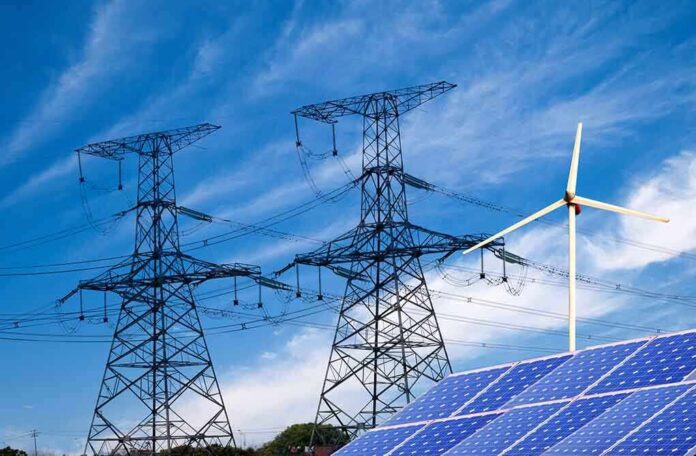House Republicans delivered a decisive blow to Biden-era green subsidies in a razor-thin vote that prioritizes nuclear energy while dramatically curtailing tax breaks for other clean energy technologies.
Key Takeaways
- House Republicans passed a “megabill” by a narrow 215-214 margin that significantly scales back clean energy tax credits from the 2022 Inflation Reduction Act.
- The legislation imposes strict deadlines for most renewable energy projects, requiring construction to begin within 60 days and completion by 2028 to qualify for tax incentives.
- Nuclear energy receives preferential treatment with extended tax credit eligibility through 2031, reflecting the GOP’s prioritization of this technology.
- Republicans framed the cuts as necessary offsets for extending the Trump tax cuts, arguing that the renewable energy industry no longer requires government subsidies.
- The bill also includes provisions to expand drilling opportunities and expedite environmental reviews for energy projects.
GOP Slashes Green Energy Subsidies While Protecting Nuclear
House Republicans have successfully passed legislation that dramatically scales back clean energy tax incentives implemented under the 2022 Inflation Reduction Act. The comprehensive bill, which passed by the narrowest of margins at 215-214, targets technology-neutral tax credits by imposing strict deadlines – projects must begin construction within 60 days of the bill’s enactment and be fully operational by the end of 2028 to receive incentives. This accelerated timeline effectively eliminates subsidies for many renewable energy projects that require longer development periods.
The legislation makes a notable exception for nuclear energy, extending credit eligibility until 2031 for existing reactors and allowing credits for new nuclear projects that begin construction by 2028, even if not operational by that deadline. This preferential treatment reflects the GOP’s view that nuclear represents a more reliable, baseload energy source compared to intermittent renewables.
Financing Trump’s Tax Agenda
Republican lawmakers positioned these subsidy cuts as necessary offsets to fund broader tax reductions, including the extension of President Trump’s 2017 tax cuts. The bill marks a significant victory for fiscal conservatives who have long criticized the Biden administration’s massive clean energy spending package. GOP leaders argue that after years of government support, renewable technologies should be able to compete in the market without taxpayer subsidies.
“We’re accomplishing a big thing here today, but we know this isn’t the end of the road just yet. We’ve been working closely with [Senate Majority] Leader [John] Thune [R-S.D.] and our Senate colleagues, the Senate Republicans, to get this done and delivered to the president’s desk by Independence Day,” said House Speaker Mike Johnson.
The bill also includes provisions to deny subsidies for certain wind and solar leasing arrangements, further intensifying the crackdown on renewable energy financing structures. Democrats argue these credits benefit all carbon-free energy sources, but Republicans maintain they disproportionately favor wind and solar while doing little to ensure reliable power generation.
Expanded Drilling and Streamlined Permitting
Beyond tax credit modifications, the legislation retains provisions for expanded offshore and onshore drilling, including in the Arctic National Wildlife Refuge and the Gulf of Mexico. These measures aim to increase domestic energy production and reduce dependency on foreign energy sources. The bill also allows natural gas pipeline developers to pay for expedited permitting and requires the Department of Energy to consider LNG export facilities in the public interest if a fee is paid.
While the bill originally included controversial public land sales in western states, these provisions were removed after significant opposition. “This was my San Juan Hill; I do not support the widespread sale or transfer of public lands. Once the land is sold, we will never get it back. God isn’t creating more land,” stated Representative Ryan Zinke.
Another key element of the legislation aims to prevent Chinese companies from accessing Inflation Reduction Act credits by the end of 2025, addressing concerns about foreign access to American tax incentives. The bill also implements new fees on electric vehicles and cuts to various climate grant programs established under the previous administration.
Senate Prospects and Industry Response
The bill now heads to the Senate, where it may face revisions as some Republican senators have expressed support for maintaining certain clean energy subsidies. Energy Secretary Chris Wright’s advocacy for nuclear energy support reportedly influenced the bill’s provisions that favor nuclear power. Industry leaders in the renewable sector have voiced concerns about the rapid withdrawal of tax incentives, questioning whether the clean energy industry is truly ready to operate without government support.
President Trump has indicated strong support for the overall package, particularly its tax cut provisions. During a recent White House meeting, Speaker Johnson noted, “That was a very productive meeting at the White House. It’s great to have a president who is directly engaged with what happens in the other branch of government,” said Johnson











